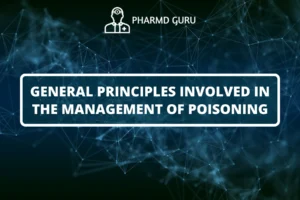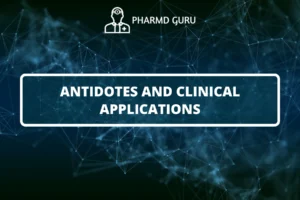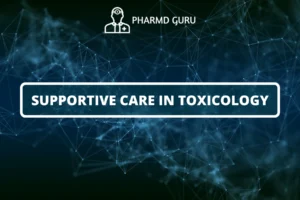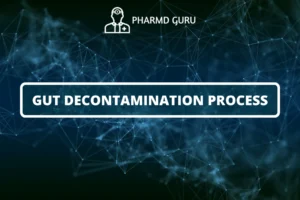While antidepressants are valuable medications for managing mental health conditions, their misuse or accidental overdose can lead to acute poisoning. Understanding the clinical symptoms and appropriate management of antidepressant poisoning is essential for prompt intervention and ensuring the best possible outcomes for affected individuals.
SCROLL DOWN TO THE BOTTOM OF THE PAGE FOR ACTUAL NOTES
TABLE OF CONTENTS:
- Introduction
- Common Antidepressants Involved in Acute Poisoning
- Clinical Symptoms of Antidepressant Poisoning
- 3.1. Serotonin Syndrome
- 3.2. Cardiovascular Effects
- 3.3. Central Nervous System Effects
- 3.4. Other Symptoms
- Management of Antidepressant Poisoning
- 4.1. Immediate Actions
- 4.2. Medical Interventions
- 4.3. Supportive Care
1. Introduction
While antidepressants are valuable medications for managing mental health conditions, their misuse or accidental overdose can lead to acute poisoning. Understanding the clinical symptoms and appropriate management of antidepressant poisoning is essential for prompt intervention and ensuring the best possible outcomes for affected individuals. This article explores the common antidepressants involved in acute poisoning, the clinical symptoms that may arise, and the recommended management strategies.
2. Common Antidepressants Involved in Acute Poisoning
Several classes of antidepressants may be involved in cases of acute poisoning. Commonly implicated antidepressants include selective serotonin reuptake inhibitors (SSRIs) such as fluoxetine, sertraline, and escitalopram, as well as tricyclic antidepressants (TCAs) like amitriptyline and nortriptyline. Other antidepressants, such as serotonin-norepinephrine reuptake inhibitors (SNRIs) and monoamine oxidase inhibitors (MAOIs), can also be associated with poisoning incidents.
3. Clinical Symptoms of Antidepressant Poisoning
The clinical symptoms of antidepressant poisoning can vary depending on the specific medication ingested, the dose taken, and individual factors. Here are some common symptoms that may occur:
3.1. Serotonin Syndrome
Antidepressant poisoning can lead to serotonin syndrome, a potentially life-threatening condition characterized by an excess of serotonin in the body. Symptoms of serotonin syndrome may include:
- Agitation and restlessness
- Confusion and hallucinations
- Rapid heart rate and high blood pressure
- Dilated pupils
- Tremors and muscle rigidity
- Profuse sweating
3.2. Cardiovascular Effects
Certain antidepressants can have significant cardiovascular effects when taken in excessive amounts. These effects may manifest as:
- Irregular heart rhythms (arrhythmias)
- Increased or decreased blood pressure
- Rapid or slow heart rate
- Chest pain or discomfort
3.3. Central Nervous System Effects
Antidepressant poisoning can impact the central nervous system, resulting in symptoms such as:
- Drowsiness and sedation
- Dizziness and loss of coordination
- Seizures or convulsions
- Coma
3.4. Other Symptoms
Additional symptoms that may occur in cases of antidepressant poisoning include:
- Nausea, vomiting, and diarrhea
- Dry mouth
- Blurred vision
- Difficulty urinating
- Respiratory distress
It’s important to note that the severity and combination of symptoms can vary widely, and medical attention should be sought immediately in cases of suspected antidepressant poisoning.
4. Management of Antidepressant Poisoning
4.1. Immediate Actions
In cases of acute poisoning, the following immediate actions should be taken:
- Call Emergency Services: Contact local emergency services or a poison control center immediately to seek professional medical guidance.
- Provide Information: Provide detailed information about the suspected antidepressant ingested, the dosage, and the individual’s current symptoms.
4.2. Medical Interventions
Medical professionals may employ the following interventions for managing antidepressant poisoning:
- Gastric Decontamination: Depending on the time elapsed since ingestion and the specific circumstances, gastric decontamination techniques such as activated charcoal administration or gastric lavage may be considered to reduce absorption.
- Enhanced Elimination: In certain situations, enhancing drug elimination from the body may be attempted through interventions like urinary alkalinization or hemodialysis.
- Specific Antidotes: Some antidepressant poisonings have specific antidotes available. For example, sodium bicarbonate can be used for TCAs overdose, while serotonin antagonists like cyproheptadine may be utilized for serotonin syndrome.
- Supportive Measures: Supportive care measures, including monitoring vital signs, providing oxygen therapy, and managing symptoms such as seizures or arrhythmias, are crucial for stabilizing the individual’s condition.
4.3. Supportive Care
Supportive care is an essential component of managing antidepressant poisoning and may include:
- Monitoring: Regular monitoring of vital signs, cardiac rhythm, oxygen saturation, and urine output.
- Fluid and Electrolyte Management: Maintaining proper fluid and electrolyte balance to prevent complications.
- Symptomatic Treatment: Addressing specific symptoms such as seizures, arrhythmias, or agitation through appropriate medications and interventions.
- Psychological Support: Offering psychological support to the individual and their family during the recovery process.
ACTUAL NOTES




